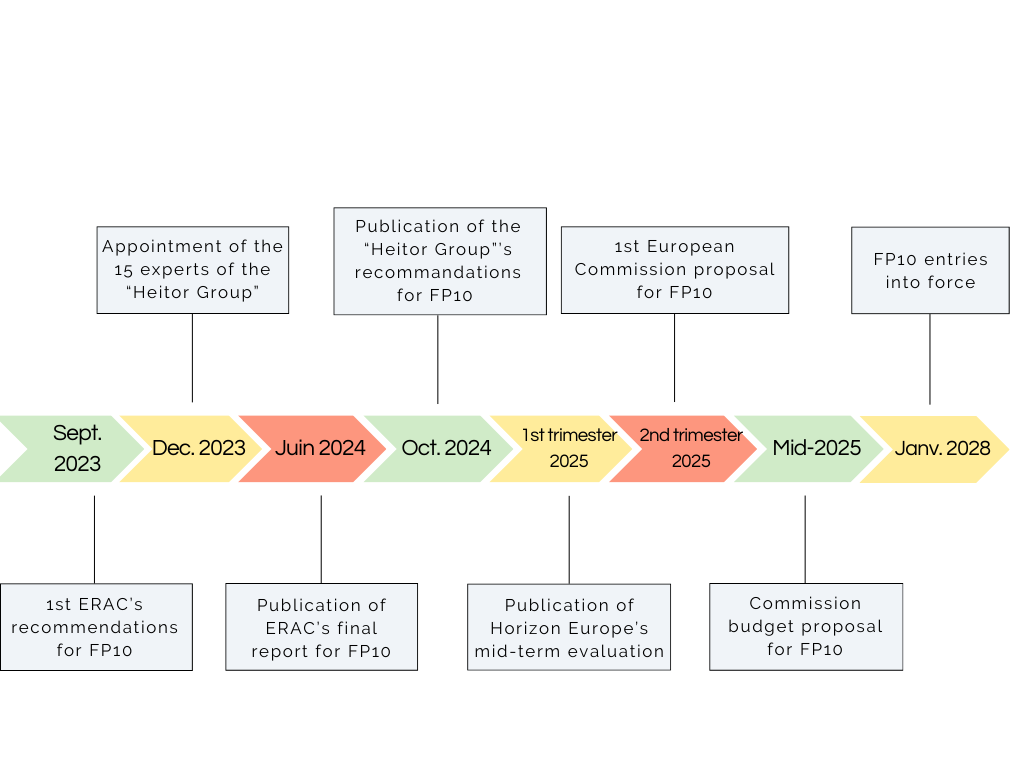As the Horizon Europe programme reaches its halfway point, discussions on the next Framework Programme (FP10) have already begun to emerge. Pending an initial proposal from the European Commission by mid-2025, a wide range of stakeholders (research centres, universities, associations, industries, Member States, etc.) have expressed their positions and recommendations regarding FP10.
A long negotiation process
The Framework Programme negotiation process is based on the institutional triangle: the European Commission draws up an initial proposal, which is then debated by the Council (notably within the Research Group, which brings together the research ministries of the 27 Member States), before finally being put to the vote in the European Parliament.
The key challenges of the next Framework Programme include:
– Doubling the Horizon Europe budget
– The balance between fundamental research and innovation
– The future of the Missions
– Measures to encourage the participation of Member States or Associated Countries considered to be “less performing” in terms of R&I according to the criteria set out in the European Commission’s report.
– The platform of strategic technologies for Europe (STEP)
– and the integration of AI into Research and Innovation projects
A busy European calendar

In July 2022, the European Commission published a Consultation on the interim assessment for the future of EU research and innovation programmes which received over 2,700 responses, including 265 position papers. The results of the public consultation represent a valuable contribution and will feed into the ongoing strategic planning process for the next Horizon Europe 2025-2027 strategic plan and the preparations for the next framework programme. The final version reflecting the various opinions received will be published at the end of 2024.
To draw up an initial proposal in line with the current challenges, the European Commission is consulting committees and advisory groups, such as the European Research and Innovation Area Committee (ERAC). EU Member States were given the opportunity to decide on the challenges for the next research and innovation framework programme in a final report submitted to the European Commission and published in June 2024.
The end of 2023 saw the appointment by the European Commission of a group of 15 high-level experts, also known as the ‘Heitor Group’, after its chairman Manuel Heitor, a former Portuguese Research Minister. This model is modelled on that of the ‘Lamy Group’, set up as part of the preparations for the current Horizon Europe programme. Over the coming months, this group’s mission is to reflect on the many challenges raised by the next Framework Programme and to announce clear choices on the place of Research and Innovation within Europe. The Heitor Group’s recommendations will be based in particular on the final evaluation of the Horizon 2020 programme and will be available at the end of October 2024.
A mid-term evaluation of the Horizon Europe programme will also be available in the first quarter of 2025. This will enable the European Commission to refine its first proposal for the next framework program, due in mid-2025. This will be followed by a cycle of negotiations, leading up to the launch of the 10th Framework Program in early 2028.
First positions from the EAIC (European Association of Innovation Consultants)
Drawing on the extensive expertise of its members, who have supported numerous projects funded by the Framework Programme, the European Association of Innovation Consultants (EAIC) published a position paper in June, setting out a number of recommendations. These are based on the collective experience and knowledge gained from working closely with applicants and beneficiaries from industry, universities, research and technology organizations, and public authorities.
This document is structured around 8 recommendations:
- Increase the overall FP budget: Double the budget to €200 billion in order to support a greater number of high-quality proposals and address crucial societal challenges.
- Clarify the rules for participation: Improve the Annotated Grant Agreement (AGA) with more country-specific examples to streamline project implementation.
- Improve the evaluation process: Implement systematic cross-checks of expert profiles to identify conflicts of interest, redefine evaluation criteria and organise consensus meetings for all calls to ensure a fair and transparent evaluation process.
- Recognise professional project management: Authorise the delegation of project management services to professional organisations.
- Support start-ups: Increase funding for deep tech start-ups and improve the transparency of the EIC Accelerator selection process.
- Guiding the use of artificial intelligence: Ensuring the responsible and transparent use of AI in FP10 processes, respecting regulations and protecting proprietary information.
- Strengthening EU partnerships: Implementing transparent selection criteria and defining common Key Performance Indicators (KPIs) to encourage broad participation, ensuring that Europe remains at the forefront of technological developments.
- Maximising the impact of projects: Introduce new funding tools to support the transfer and exploitation of knowledge after projects, to ensure sustainable impact and benefits from funded R&I projects.
‘The EAIC position paper proposes a roadmap for improving the EU’s next framework programme for research and innovation. By addressing these key areas, we can ensure that researchers, innovators and organisations across Europe have the support they need to make significant advances and tackle major societal challenges,’ said Virginie Robin, EAIC board member in charge of advocacy.
The Euronovia team is keeping up to date with the latest developments in the negotiations on the future framework programme!
